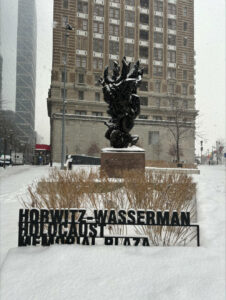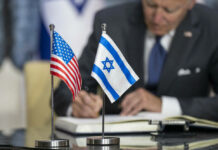
International Holocaust Remembrance Day is on Jan. 27. Meantime, South Africa’s lawsuit against Israel accusing it of genocide is before the International Court of Justice.
The word “genocide” was coined during World War II to help define what was happening to the Jews during the Holocaust. Now, it’s being wielded against the Jewish state.
There are two questions here.
Does the case have merit? And if it doesn’t, what impact does the cheapening of the word genocide have on Holocaust remembrance?
Does the case have merit?
Article II of the 1948 Genocide Convention defines the word as “any of the following acts committed with intent to destroy, in whole or in part, a national, ethnical, racial or religious group, as such: killing members of the group, causing serious bodily or mental harm to members of the group, deliberately inflicting on the group conditions of life calculated to bring about its physical destruction in whole or in part, imposing measures intended to prevent births within the group, forcibly transferring children of the group to another group.”
The key word is “intent.”
More than 25,000 people in Gaza have died since Israel launched its response to the Oct. 7 Hamas attack. That number comes from the Hamas-run Gaza Health Ministry. While it may not be reliable, even the most ardent Israel supporters acknowledge that many have died.
But killing people is likely not Israel’s “intent.”
“What Israel is doing to the people of Palestine is not deliberate. It’s unfortunately the result of war,” said Lise Marlowe, the outreach director at the Holocaust Awareness Museum and Education Center in Elkins Park. “This could end tomorrow if Hamas gives the hostages back and stops shooting at Israel.”
If you refer to Israel’s war as a genocide, you can do the same with any war, according to Eszter Kutas, the executive director of the Philadelphia Holocaust Remembrance Foundation.
“They notify the local population through various means when they take an action to ensure that civilian casualties are minimized,” said Kutas of the Israeli military. “It really is the opposite of what’s described in Article II of the convention.”
Ayal Feinberg, director of the Center for Holocaust Studies and Human Rights at Gratz College, explained that Hamas’ death toll figures do not distinguish between civilians and “people participating in warfare.” Israel has claimed to have killed about 9,000 Hamas terrorists. If that’s true, then a significant percentage of the casualties are enemy combatants. Feinberg also believes it’s important to consider Hamas’ use of human shields.

If that ratio and analysis of Hamas’ tactics are accurate, then Israel at least appears to be attempting to act with precision, according to Feinberg.
“It just doesn’t — in any way, shape or form — comport with any reasonable understanding of what genocide is,” he said.
If the case doesn’t have merit, what impact does the cheapening of the word have on Holocaust remembrance?
“It minimizes the impact of the Holocaust,” Kutas said. “And it’s also scary for how we’re looking at our future because it starts a practice that you can call any war and any military action a genocide. And therefore, in the long term, the term will be thrown around too easily and will not carry the weight it should have.”
Feinberg added that, “Making the act of committing a genocide less unique will ultimately make combating genocide that much more challenging.”
If the word continues to be applied without relationship to its original definition, it may not hold the same weight when people hear it on days such as International Holocaust Remembrance Day.
“It’s too early to tell. But that’s an important and testable hypothesis,” Feinberg said. “It’s incumbent upon researchers like myself to examine what the effects are of the misuse of the term genocide and what the potential consequences are.”
Feinberg believes that the International Court of Justice can help.
“It’s important to have a generalizable idea of what the term is in the legal arena,” he said. “I hope that the ICJ will arrive at a decision that reflects the original intent of the term genocide and the widely used definition of the term genocide outside of this conflict.”
Kutas thinks that organizations like hers need to be as outspoken as anti-Israel activists in using and defining the term.
“For organizations like us and any of our peers who are dedicated to teaching history and building more tolerant worlds together, it’s incumbent on all of us to make sure we are very clear on what genocide is and what genocide isn’t,” she said. “Everything that has happened over the past three months is a call to double down on our mission. Preserving the lessons of the Holocaust to create a future of tolerance.”







Israel is not committing genocide. The Palestinian population has grown since 1948. If anything, the Palestinian leaders are committing cultural genocide by denying the historicity of Jews’ connection to Eretz Israel.